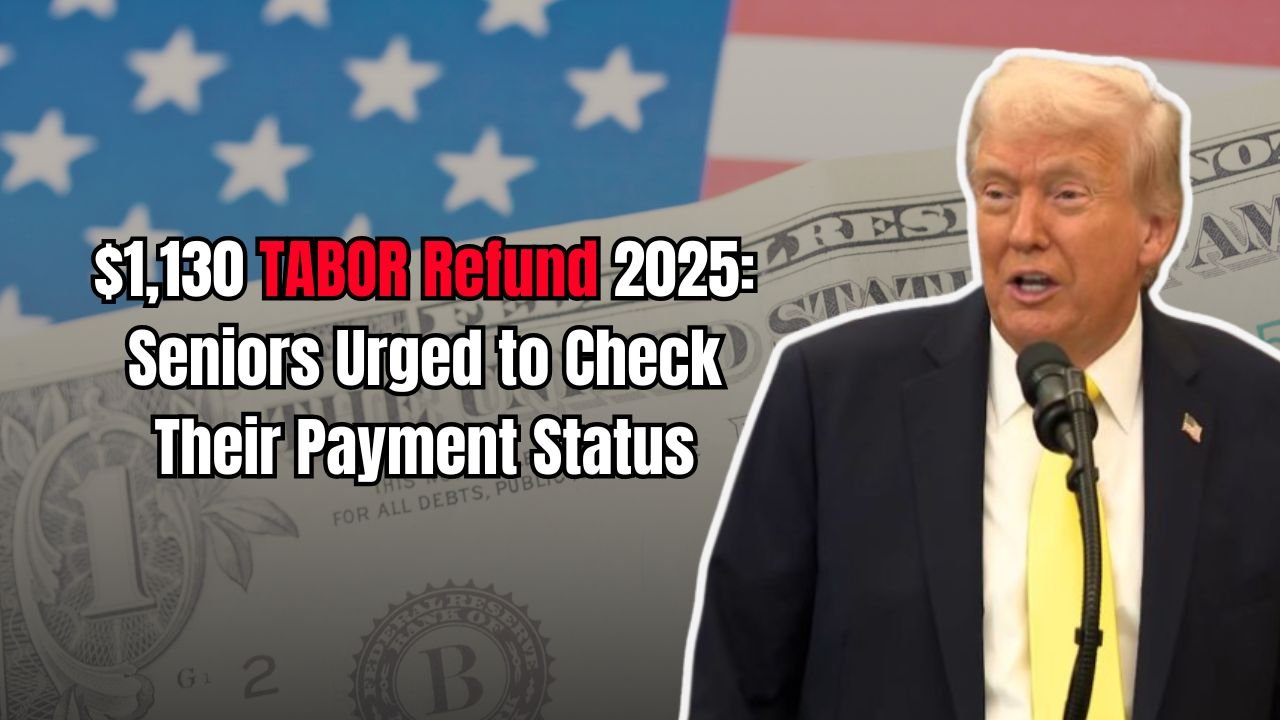Good news for taxpayers in Colorado in 2025: seniors are set to receive a $1,130 refund through the state’s Taxpayers Bill of Rights (TABOR) procedure. This payout is especially meaningful for older adults living on tight budgets, helping offset rising costs like groceries, utilities, and health-care.
The TABOR refund mechanism—where the state returns surplus funds to residents—is a core piece of Colorado’s fiscal setup. With seniors getting the largest share this year, 2025 stands out compared to previous years.
What is TABOR and how does it function?
The Taxpayers Bill of Rights is a constitutional amendment passed by Colorado voters in 1992. Its main goal is to cap state revenue and spending annually. Whenever state revenue exceeds the legal limit, the excess must be returned to taxpayers under this measure.
Refund amounts under TABOR have fluctuated over time. In strong economic years the payouts rise, in lean years they shrink. Despite the swings, this refund system remains a key part of how Colorado handles its finances.
Why is the refund $1,130 for seniors in 2025?
The state has confirmed that for 2025, seniors will receive a refund of $1,130. This figure was determined after assessing overall state revenue, surplus amounts, and the distribution formulas for different taxpayer groups.
Senior citizens were prioritised because their incomes are often fixed and don’t keep pace with inflation. As a result, this year’s refund ranks among the highest in recent history. Seniors can use the money for essentials—like prescription drugs, utility bills, or even travel—and it offers some added financial security and peace of mind.
Who qualifies and how is the payment made?
Eligibility criteria
- Must be a resident of Colorado and a taxpayer during the applicable tax year.
- Filing a state income tax return is required, even if your income was very low or non-taxable.
- Seniors who meet the age requirement automatically fall into the higher refund bracket.
How the payment is distributed
The refund is managed by the Colorado Department of Revenue. Payments are automatic — either via direct deposit or by mailed check. Seniors — you don’t need to submit any extra forms to receive it.
TABOR Refunds in Prior Years
Looking at past figures helps understand how 2025 stacks up.
| Year | Average Senior Refund | Approximate State Revenue Surplus |
|---|---|---|
| 2022 | $750 | $3.7 billion |
| 2023 | $800 | $4.1 billion |
| 2024 | $900 | $4.8 billion |
| 2025 | $1,130 | $5.2 billion |
The refund jump in 2025 is clearly significant when viewed in this context.
How this refund benefits seniors and the community
The TABOR refund is about more than just extra cash. For seniors, it can:
- Cover essential costs such as utilities, groceries, and medication.
- Assist with health-care and travel for medical appointments.
- Offer a buffer for unexpected expenses, and many seniors channel this money back into their local communities—boosting local businesses. In effect, the refund helps return the state’s excess funds back into citizens’ hands.
How Colorado’s refund stacks up against other states
Some other states offer rebates or tax relief, but the clarity and automatic nature of Colorado’s process stand out.
| State | Program Type | Senior Benefit in 2025 |
|---|---|---|
| Colorado | TABOR Refund | $1,130 for seniors |
| California | One-Time Relief Rebates | Varies |
| Minnesota | Tax Rebate Program | Smaller amounts |
| Oregon | “Kicker” Refund Percentage | Based on revenue percentage |
This comparison illustrates that Colorado’s system offers a consistent, predictable benefit.
What’s ahead for future refunds?
The large refund in 2025 is encouraging, but it may not become the new norm. If state revenue drops, future refunds may shrink. The important takeaway is that the design of TABOR ensures any surplus revenue must be returned to citizens. That makes it a vital part of Colorado’s financial framework, and it keeps the balance between state economic power and taxpayer rights.
Conclusion
For Colorado seniors, the 2025 TABOR refund of $1,130 is a meaningful boost. It doesn’t just help them cover bills—it gives them extra stability and peace of mind. The TABOR system shows that when the state does well, its citizens do too. It’s more than just financial relief—it’s a way of improving quality of life and granting seniors greater independence.
FAQs
What happens if I didn’t receive the refund automatically?
If you meet all eligibility criteria but don’t receive the refund, contact the Colorado Department of Revenue. They can verify your tax records and ensure you filed correctly.
Is the $1,130 amount guaranteed every year?
No. The $1,130 figure applies to 2025 only. Future refund amounts depend on state revenue and surplus levels—so the amount may be higher or lower in other years.
Do I need to apply separately for the TABOR refund?
No application is required. As long as you file your state income tax return and meet eligibility criteria, the refund will be issued automatically via direct deposit or check.


